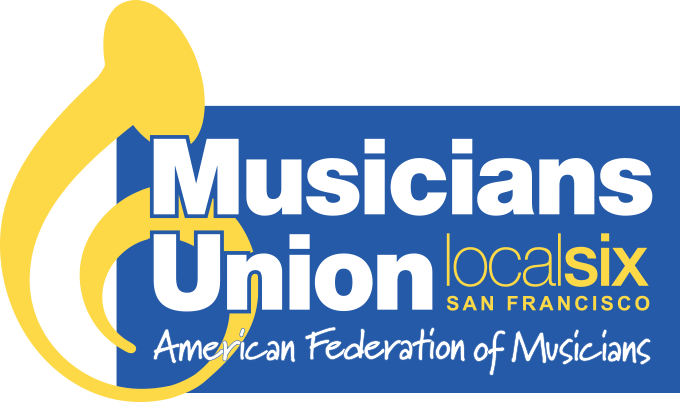Member Profile: Straight Ahead With Larry Vuckovich
by Alex Walsh
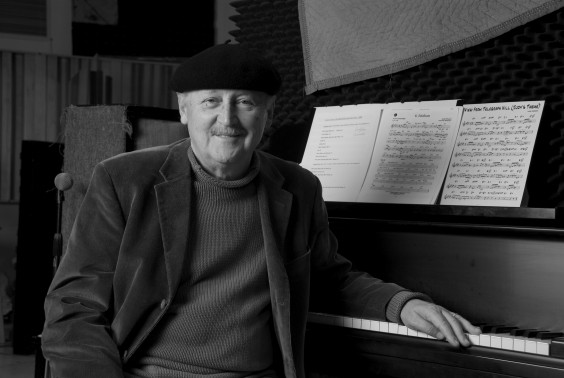
“If you’re wondering what brother Vuckovich is doing here, he comes from that part of Yugoslavia known as Monte…Negro”. – Jon Hendricks, Evolution of The Blues, 1974
“Of course, it’s a play on words about the state of Montenegro, where I come from,” says Larry. “Jon used that one line in the show every night. Even though I looked different on stage, the music that I brought fit right in.”
Evolution of the Blues was a popular San Francisco stage show produced by vocalist Jon Hendricks in the 1970s. It had an all black cast, black musicians, and Larry Vuckovich. Larry had worked for Hendricks since the mid-sixties. “There was some political pressure against picking me. But I said, ‘Jon, black musicians play Chopin and Mozart. Isn’t this the evolution of the real music, kind of like Miles had a white piano player?’ I said ‘Because I work with you, let me show them how I play it.’”
Larry played the show for two years, despite the racial controversy. “When the great bebop pianist Cedar Walton saw the show, he gave me a most positive acknowledgement.”
Larry is a jazz survivor. He has played as a sideman with many of the greats, led his own successful groups, played clubs, festivals, hotels, private events, television, radio, released albums on major jazz labels, and started his own record label. He speaks with a Serbian accent. His main concern is soul. “If it’s good music, I don’t care what style it is man, just play it and have fun.”
He loves film noir. As a teenager he learned to speak English at the movie theater, watching films like Asphalt Jungle. “Those films show the real, raw behavior of people. People of conscience will stand up. The sell-outs will sell you for a nickel.”
Larry has first-hand knowledge of this. During WWII, in Yugoslavia, his parents were ratted out to the Germans for hiding an American pilot in their attic. Later, when the communists came to power, his uncle was shot because there wasn’t enough room in the prison truck.
The Vuckoviches immigrated to the United States in 1951. They were lucky. Larry’s father, Milutin (Emile) Vuckovich, had a US passport. As a young man, Emile did what many Europeans did at the time—came to the New World looking for adventure, and work. He arrived in San Francisco in 1910. For years he worked on the Alaskan fishing boats and as a waiter in San Francisco’s posh restaurants. When WWI began, he joined the army. After the war, his brothers opened a factory on the Bay of Kotor in Montenegro (in the former Yugoslavia), and they asked him to come and help. The family became very successful selling olive oil, cosmetics, toothpaste, glycerine, and other products. Emile soon met Larry’s mother, Mileva (Mildred), who was from Herzegovina. Their first son, Andrew (Andrija), was born in 1930, and Larry was born in 1936.
“We had a 16-room villa. They were well to do, but a lot of rich people are so stingy and cold. My family helped poor people. They would give jobs. Even if there was nothing, they would create something.”
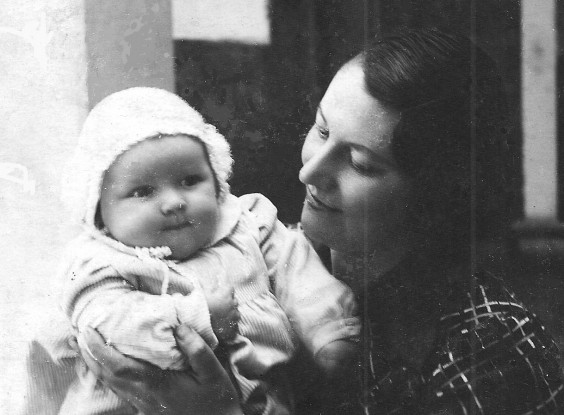
Larry with his mother, Mileva, in their hometown, Kotor.
The Vuckoviches had a grand piano in their house. Both Larry’s mother and brother played. When he was 6, Larry started music school. “These small towns were not like villages; they had music schools, theaters—all the arts.” Larry received a basic classical training: composers and scales and theory. “We were taught to sight-sing. My teacher was so open-minded. She had us listen to folk music—had us play accordions, and dances.”
“When I heard folk music on the radio, those minor keys immediately hit me. But when I heard jazz on the armed forces radio, I said, ‘this is it!’ I knew right away.”
During the war, Larry remembers the Nazis occupying his town, followed by the Italians, whom he says were much nicer. One day a squadron of Germans surrounded their house. Someone had told them the Vuckoviches were hiding an American. “Three officers knocked on the door. My father opened the door, and they said, ‘We understand you have strangers.’ My father made a joke. ‘Of course I have strangers, I have you, ha ha ha.’”
The Germans were not amused. They searched the house, but did not find the pilot. He had been smuggled out on a fishing boat the week before.
In 1945, when the Communists took power, Larry’s father was sent to prison for two and a half years. His brother, age 14, was jailed and tortured for two weeks because the authorities wanted to make an example of children. “When my father was in jail, it was tough. I went fishing. When he got out, we were fishing in the bay all the time. So we got by.”
Directly after leaving prison, Larry’s father, an American citizen, went to the American Embassy in Belgrade to renew his passport. The Communist Government stalled the process for years. Finally, after some strong-armed intervention by the American Ambassador, they got their passports. In 1951, the Vuckoviches took an Italian boat from Genoa to New York. “Can you imagine looking at New York from the boat, all the shiny cars? The only time I had seen that was in a movie called Tarzan’s New York Adventure.”
The Vuckoviches stayed in New York for a week, and then flew to San Francisco where they lived with friends on 18th & Taravel. “I learned English by going to the Parkside theater, and listening to the radio. Kids at school laughed at my pronunciation, but after 6 months I was proficient.” In 1953, the family bought a house on Pacheco Street in the Sunset District, and Larry attended Lincoln High School. They also bought a piano.
“At Lincoln, you know how it is normal today to have clinics and things like that? In those days —nothing. We had a teacher, Dr. Irving Gordon who, with his wife, had a classical string quartet. But he loved jazz, and luckily we had enough players to put on the first jazz concert in the high school.”
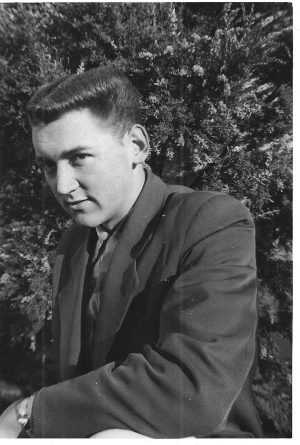
Larry while at Lincoln High.
While in high school, Larry met the legendary Vince Guaraldi at the famous Black Hawk club, and eventually became his only student. “My first teacher was Cal Tjader’s wife, Pat Tjader. She played very sophisticated harmonies. She opened me up to Bill Evans and Ellis Larkins, beautiful harmonic things with a soft touch. When she became pregnant, she turned me over to Vince, who was playing with Cal. I went to Vince’s house in Westlake every week, or as much as possible. He’d show me things. We’d listen to Bud Powell and different records.”
Little by little, Vince sent Larry to sub for him, which was very exciting. “The first time was a club in Palo Alto. I played with Irene Kral. I could read the changes, not really a lot of notes, but she was encouraging.”
Larry graduated from high school in 1956. He wanted to study music at SF State, but his parents insisted he be an architect. “At least I got some general credits out of the way.” He continued to gig, and joined Local 6 in 1957. By 1960, Larry had dropped architecture, was going to music school part time, studying privately with pianist Richard Wyands, and playing all over town.
“In ‘61, John Mosher, bassist, said, ‘I have a gig, two weeks, playing intermissions with Duke Ellington.’ I said, ‘Geez, I’m going to school. I have to be up early.’ And he said, ‘Man, come on, forget it man. You want to be a musician?’ So I said, ‘Yes, of course!’ So things like that happened.”
Larry was soon hired for the house band at Off Broadway, a jazz supper club in North Beach. “We played with Mel Tormé, the Hi Lo’s, we opened for Lenny Bruce—all kinds of things.” Larry says he was very fortunate to have been embraced by older players, such as Brew Moore (Lester Young-inspired tenor player), drummer Benny Barth, and saxophonist John Handy. “John was a major influence and he was a mentor. We reconnected at SF State in 1960 when he came back from New York after a successful run with Charles Mingus. John was finishing his music degree and brought to the school such masters as Milt Jackson and Rahsaan Roland Kirk to jam with us. You can imagine the excitement we had playing and learning from those great musicians. John taught us a number of important elements in jazz that we needed to know. Even though I didn’t have the experience, they felt I had some feeling, and I had potential. When I played with them, it was very harmonious. I always had a groove and rhythm.”
In early 1963, Larry went to Europe and spent most of the year in Copenhagen. “The jazz scene there was fantastic. Dexter Gordon was living there, and I worked with him at the famous Montmartre jazz club, inluding Dexter’s historic tenor summit with Don Byas and Paul Gonsalves, and at the Ossiach Jazz Festival in Austria. There were some excellent Danish jazz musicians playing at that time in Copenhagen. Towards the end of the year, I went to Berlin and finished the year there. I had a trio after-hours gig, and also worked one night at the Blue Note in Berlin with Herb Geller.”
Larry came home to San Francisco in 1964, but in the summer went back to Scandinavia, where he played in Norway, Sweden, a short one-week trip to Greece, and then back to a final performance in Stockholm. He returned to San Francisco in the middle of 1965, and soon after was hired by the great jazz vocalist Jon Hendricks. “It was an experience to work with one of the masters. He could really scat like a horn. His harmonies were not guess work. All the lines with the changes, everything was right on.” While on the road, the Hendricks band worked with Clark Terry, Dizzy Gillespie, and Philly Joe Jones, among others.
In 1968, Hendricks took the band to Europe where they played clubs and festivals. “We were in London for awhile, but I couldn’t play very much because the British musicians union is very tough. English guys can work anywhere, everywhere. But I could only work certain limited gigs.” Because of the temporary lack of work, Larry went to Munich, where he got a steady gig at the famed Domicile club accompanying visiting American players, including Slide Hampton, Philly Joe Jones, Lucky Thompson, and Pony Poindexter. He joined Jon Hendricks later in the tour. “Through Jon Hendricks I met so many people. We played major festivals in Europe. Norway, Germany, Italy—everything was paid. The money wasn’t that great when you’re a sideman working with a big name. But I tell you, hearing all the greats and playing with them—and being on the bill with them and listening—and you’re single too, and the chiquita bananas (pretty ladies) in Europe. God! Scandinavia was really something.”
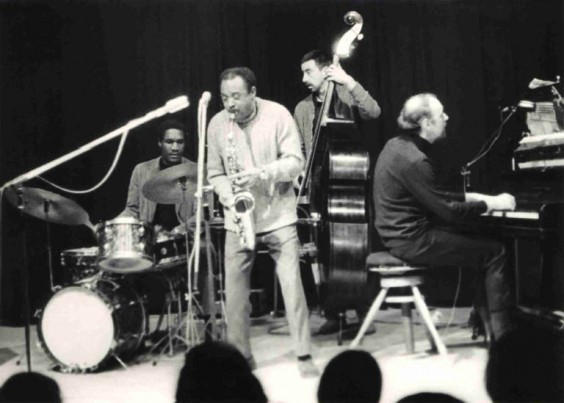
Pony Poindexter Quartet at St. Gallen, Switzerland, 1970.Clarence Becton, drums,
Pony Poindexter, saxophone, Isla Eckinger, bass, Larry Vuckovich, piano.
Larry met his first wife, Linda, in Munich. They took a vacation to the states and got married. For their honeymoon, they drove Larry’s car, a Volvo, from San Francisco to the East Coast. They then took the famous French boat, Île de France, to Europe with the car.
By 1970, Larry felt it was time to leave Munich. “I started missing the steady feel of American music. Europe is great, but it’s still not America.” They drove to Switzerland for a gig, and then along the coast to Portugal. While they waited two weeks for the boat to arrive, Pony Poindexter happened to come to town and hired Larry for a TV show and club gig. “Things just happened, man, it was really interesting.”
Back in San Francisco, Larry played many steady gigs, special concerts, and recording sessions. Highlights of this period include a positive review by Phil Elwood for the Larry Vuckovich/Noel Jewkes Quartet, Hues, at the Deck House in Sausalito, and playing with his mentor, Vince Guaraldi, in his two-keyboard quintet at the Great American Music Hall.
In 1974, Larry started a ten year run as pianist for the KGO-TV AM San Francisco morning show. He played with many guest artists, including Cab Calloway, Kenny Burrell, Joe Williams, Rosemary Clooney, and Tony Bennett. “Tony Bennett was so nice, so relaxed, just very respectful. Just pick a standard key and you just go and play.”
Evolution of the Blues started in 1974. After two years, Larry says he needed a break. “I needed to play some more open jazz. So I went to work with Anita O’Day at the Matador, then later with Gerry Mulligan, and started doing other gigs.” Larry says playing Evolution of the Blues did impact his career. “Racial stuff is very interesting. I never had a problem with the great musicians who are really open to music. But in San Francisco, I found some of the white guys wouldn’t call me. And some of the black guys didn’t like someone who was playing strong jazz.”
Rather than waiting for people to call, Larry decided to try something new—a hotel gig. He approached the Grand Hyatt in San Francisco. The manager, a lover of jazz, took one look at his resume and hired him on the spot. As music director, Larry was able to bring in different band configurations to keep things interesting. “I became more of a bandleader in the late seventies. I became really confident in the music I was performing.”
This confidence coalesced in his first record, Blue Balkan, released in 1980 on Inner City Records. The album, a fusion of Balkan, Gypsy/Roma, Middle Eastern scales, and jazz, featured Bobby Hutcherson on vibes. It was well received; critics called it a pioneer recording in jazz-world music. During this same time, Larry also became house pianist at the iconic San Francisco jazz club, Keystone Korner, succeeding George Cables, for a five-year run with bassist, James Leary, and drummer, Eddie Marshall, until its closing in 1983.
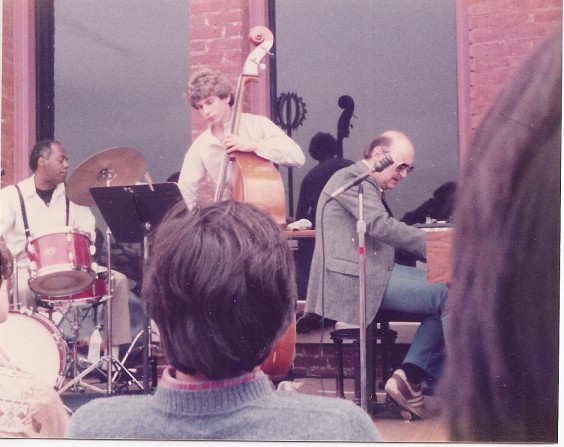
Larry Vuckovich Trio at SF Jazz Festival, Ghiradelli Square, 1983.
Eddie Marshall, drums, Larry Grenadier, Bass.
In 1982, the Vuckoviches had a son, Alexi, who became a classical pianist and just received his Masters in classical piano from SF State. During this period, Larry continued to play in his own groups and with his friends, including Bobby Hutcherson, Larry Grenadier, Eddie Marshall, Pete Escovedo, Tom Harrell, Noel Jewkes, and Jules Broussard, to name a few. In 1984, the management at the Grand Hyatt changed and wanted different music. Ready for something new, Larry decided to move to New York. He was hired as music director for Sunday brunch concerts at the Parker Meridien Hotel, and over the course of five years jammed with all the top musicians in town, performing at all the major jazz clubs including the Village Vanguard, the Blue Note, and Birdland. In 1990, he returned to San Francisco because, he says, “I got tired of ice and snow.”
Larry returned to the Grand Hyatt, which was again under new management, and played there until the late nineties. Major stars would sit in, including Bobby McFerrin, Percy Heath, Oscar Brown Jr, and actress-singer-comedian, Carol Burnett, who sang Gershwin medleys from the piano bench. Herb Caen mentioned Larry several times over the years. During this period he played many special concerts in many band configurations, including the SF Jazz Festival and the Belgrade (Yugoslavia) Jazz Festival.
In 1997, Larry’s wife died of cancer.
Around this time, the Grand Hyatt again came under new management, which, Larry says, was very square and had no ear for music. ”I left and became a music director at a brand new place by the Ferry Building, Shanghai 1930. It was first class. I had great guys playing there. That lasted a couple years.”
In 2000, Larry recorded Young At Heart, an album saluting Lester Young, Count Basie and Charlie Parker. It featured Noel Jewkes, Jules Broussard, Josh Workman, Nat Johnson, Buca Necak, Dottie Dodgion, Bob Basa, Harold Jones, and Louis Romero. They received rave reviews for their performance at the Monterey Jazz Festival.
Young At Heart, a reference to Lester Young, was released by a business man who wanted to record the project. When he lost interest, Larry and his wife, Sanna Craig, issued the CD on their own label, Tetrachord Music. “In this new venture, we have produced some successful, well received CDs. The current CD, Something Special with Scott Hamilton (2011), got the highest radio airplay that I’ve ever had. It received the number three spot on the jazz week radio charts and stayed on the charts for seven months. The other reason for making our own records was that we could have total control over what music to play. Nobody had to dictate to us what to do.”
The 2000s saw Larry continuing to record and perform. And something new—he began playing private events. Over the years, he had always played the occasional wedding and corporate gig, but with the club scene drying up, they became his bread and butter. “I always go and play some swinging music, and the money’s really good.”
In 2001, he formed his Latin Ensemble La Orquesta El Vuko, featuring Valerie Quevedo, Noel Jewkes, Louis Romero and Hector Lugo. In 2002, he recorded more Blue Balkan material, which appeared on his Blue Balkan: Then & Now reissue. This reissue received excellent reviews and credited Larry with being in the forefront of the world music scene.
In 2002, Larry became music director and house pianist at Bistro 339 located within the Ramada Inn at Union Square. Larry played solo as well as presenting Sunday jazz concerts with national and international guests.
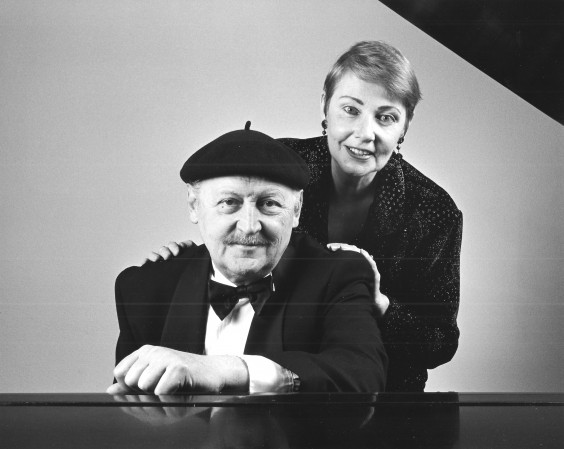
Larry Vuckovich and Sanna Craig.
For the future, Larry says he will always keep playing as a trio. This fall, he’s looking forward to playing the Belgrade Jazz Festival, which will honor his 75th birthday year. “We’ll do the classic bebop standards. I’m not going to do just the contemporary jazz and modern and modal, we’re gonna play free style—just start playing and see where somebody goes—to show that we’re not squares, we’re music.”
He also has visions of a new world music/jazz fusion CD. “It will be an extension of Blue Balkan. It’s gonna go to North Africa, Israel, maybe Turkey, and South America. Not light-weight pop, but recognizable, soulful stuff. And then, of course, it will have American contemporary swinging jazz.”
Larry laments the change that he has seen in the jazz culture. ”Today, most of the younger guys don’t call in the older guys. When I was young, I played with the older guys. I heard a difference right away. It’s like the older guy is always playing with tone, and his soul, you know? So if I had a gig, I would always hire the more experienced guys because I wanted to learn from them. As a rule the younger guys in those days were hungry, they were excited to play with the older guys. It was an exchange. That’s one thing I miss today. That’s how it was.”
To keep up on all things Larry Vuckovich, visit: www.larryvuckovich.com
